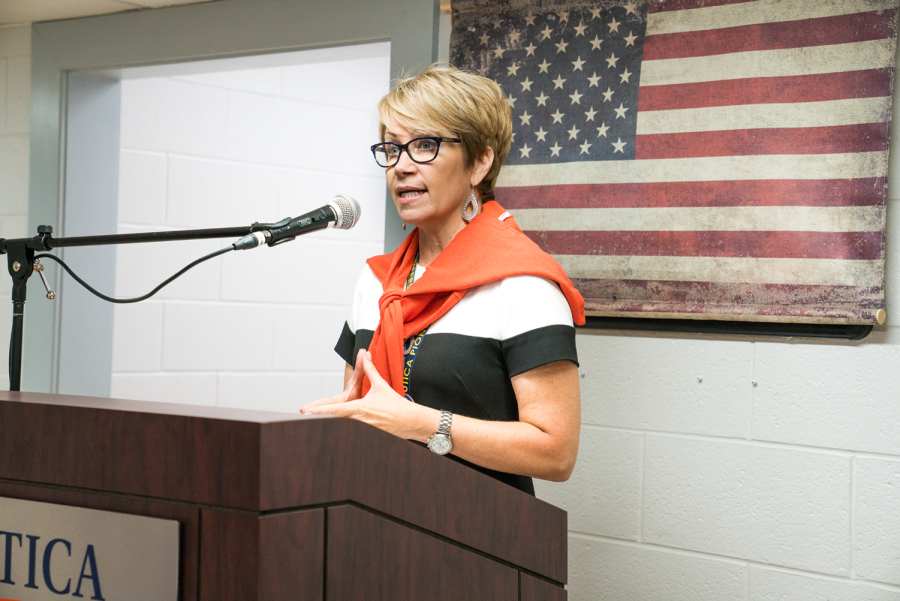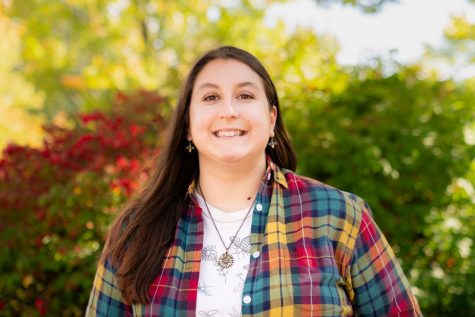Interview with President Laura Casamento: Academic Portfolio Review
President Casamento giving remarks during the Student Veteran Association office’s ribbon cutting ceremony on Sept. 6, 2022.
February 1, 2023
The first few weeks of the Spring 2023 semester have been riddled with announcements and forums pertaining to the Academic Portfolio Review taking place. The Tangerine sat down with President Laura Casamento to discuss these recent developments and how they relate to Utica University’s mission as an institution.
The Academic Portfolio Review, spurred by the Board of Trustees to holistically review the major offerings at Utica, received recommendations from Casamento and Provost Todd Pfannestiel on Jan. 18. The two-week commenting period ended Feb. 1.
Casamento has worked at Utica for 19 years this coming March and has taken the helm as president for seven of those years. At the end of July, she will step down from her role as president for retirement.
According to Casamento, the higher education market has witnessed many shifts since the COVID-19 pandemic, including the rise of adult education and hybrid models, which universities like Utica need to respond to.
“My reaction [was] that it was both necessary and timely,” she said. “We have been talking about our academic footprint and being really responsive to the market and what happens around us since we developed the Strategic Plan, which was approved in December of 2019, so it’s a very specific go-to-market strategy piece, and evaluating the programs that you offer is absolutely part of that.”
The commenting forum located on Utica’s website is segmented into three individual forums for faculty, staff and students to promote comfort in their own space. Casamento offered an anecdote regarding students who come into her office.
“I have students who come into this office and look around and they’re, even though they might say they’re not intimidated, the look on their face says, ‘well, I’m in a different space here,’” Casamento said. “I want students to be able to have the freedom to express themselves.”
She explained that faculty will be able to make a case regarding the review. This is directed mainly to faculty in majors at risk of being sunset, who are invited to give additional information for consideration.
“So the board will consider all of that information when they make their decision,” Casamento said. “Even as part of the public comment period, I’m hearing that there are areas that plan to make their case and they’re welcome to do that. The board is going to review, not only everything under review, every comment, but if a department or program wants to make its case and has other information they think is valuable to that decision, the board’s going to consider that.”
In terms of involving alumni and parents of current students, Casamento said that avenues are being investigated alongside the influx of social media comments.
“We are having the development officers reach out to the alumni base,” Casamento said. “We will be discussing the possibility of opening up a specific email avenue for that. Our main concern is to make sure that everyone on this campus community clearly understood [the recommendations] and knew that they could comment.”
There was a pause in the room when the image investigation was mentioned and a look of weariness colored the president’s face. In response to the Board of Trustees’s internal and external investigation of the graphic image, Casamento directed the question back:
“How would you respond?” she said. “I think that’s all I have to say about it.”
In the Academic Portfolio Review recommendation process, Casamento believes that there has been a miscommunication regarding the impacts.
“I think this is one of the biggest misconceptions out there right now, is that we are getting rid of these disciplines, and sunsetting a major does not mean, we are not sunsetting minors, we are not sunsetting concentrations, we are not getting rid of these disciplines,” she said, citing Construction Management as an example of a program sunsetted decades ago and is now again a part of campus DNA. “We will continue to teach coursework in that discipline, and we will take advantage of our faculty expertise and the good work that these faculty members do. That doesn’t mean that you have to have a major.”
In between sips from a green coffee mug, Casamento mentioned that the university hopes to never do a holistic overhaul of majors again after this review and instead create a smaller-scale, rotating evaluation.
“My hope, every program is reviewed in five years, but it’s rotated,” she said. “So, in the next five years, it’ll be these particular programs, and then the year after, it’ll be this particular program. If we can get that into our DNA, the need for these wholesale reviews go away.”
Through the halls of campus academic buildings, signs of discontent from faculty is visible. Casamento, who voiced support for the right of faculty to be vocal, also expressed confusion over the timing of the censure.
“The other thing that is really important here, again, they’re censuring the board for decisions they haven’t made yet,” she said. “We’re not talking enough about the fact that these disciplines are not going away, that we’re not taking the liberal arts and tossing them? The liberal arts foundation that students get through general education and through minors and concentrations is not going away.”
Another facet of the procedures lost in translation is the role of curriculum and determining academic programs, Casamento explained. Utica University is accredited by the Middle States Commission for Higher Education, whose criteria place responsibility on the Board of Trustees.
“[A legally constituted governing body] is ultimately accountable for the academic quality, planning, and fiscal well-being of the institution,” Standard VII: Governance, Leadership, and Administration said.
The president flipped through the folder of handwritten notes in her lap. The goal of the institution is to be responsive, she said, and guarantee pay-off for student investment in their education at Utica.
“We were founded in 1946 as a really responsive institution, right? An institution that responded to very critical needs around the region and workforce,” Casamento said. “In many ways, in order to ensure that we’re here in 40, 50 years from now, we have to continually evolve and be that responsive institution and what students want and need and what their families want and need. We will change and will evolve and we have to be responsive to that now more than ever.”


















![President Todd Pfannestiel poses with Jeremy Thurston chairperson Board of Trustees [left] and former chairperson Robert Brvenik [right] after accepting the university's institutional charter.](https://uticatangerine.com/wp-content/uploads/2023/10/unnamed.jpeg)






















































































































